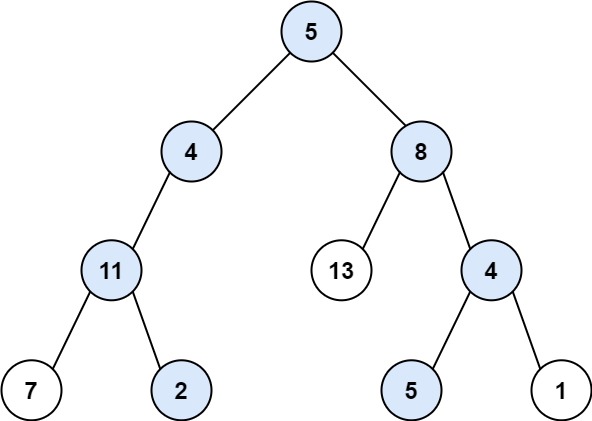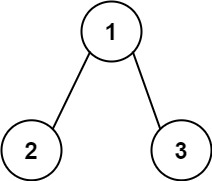Description
Given the root of a binary tree and an integer targetSum, return all root-to-leaf paths where the sum of the node values in the path equals targetSum. Each path should be returned as a list of the node values, not node references.
A root-to-leaf path is a path starting from the root and ending at any leaf node. A leaf is a node with no children.
Example 1:

Input: root = [5,4,8,11,null,13,4,7,2,null,null,5,1], targetSum = 22 Output: [[5,4,11,2],[5,8,4,5]] Explanation: There are two paths whose sum equals targetSum: 5 + 4 + 11 + 2 = 22 5 + 8 + 4 + 5 = 22
Example 2:

Input: root = [1,2,3], targetSum = 5 Output: []
Example 3:
Input: root = [1,2], targetSum = 0 Output: []
Constraints:
- The number of nodes in the tree is in the range
[0, 5000]. -1000 <= Node.val <= 1000-1000 <= targetSum <= 1000
Code
只是 Path Sum 加上印出 path 而已。
/**
* Definition for a binary tree node.
* struct TreeNode {
* int val;
* TreeNode *left;
* TreeNode *right;
* TreeNode() : val(0), left(nullptr), right(nullptr) {}
* TreeNode(int x) : val(x), left(nullptr), right(nullptr) {}
* TreeNode(int x, TreeNode *left, TreeNode *right) : val(x), left(left), right(right) {}
* };
*/
class Solution {
public:
vector<vector<int>> pathSum(TreeNode* root, int targetSum) {
vector<vector<int>> paths;
vector<int> path;
dfs(root, paths, path, targetSum);
return paths;
}
void dfs(TreeNode* node, vector<vector<int>>& paths, vector<int> path, int targetSum) {
if(!node) return;
if(!node->left && !node->right) {
if(targetSum == node->val) {
path.push_back(node->val);
paths.push_back(path);
}
return;
}
targetSum -= node->val;
path.push_back(node->val);
if(node->left)
dfs(node->left, paths, path, targetSum);
if(node->right)
dfs(node->right, paths, path, targetSum);
}
};